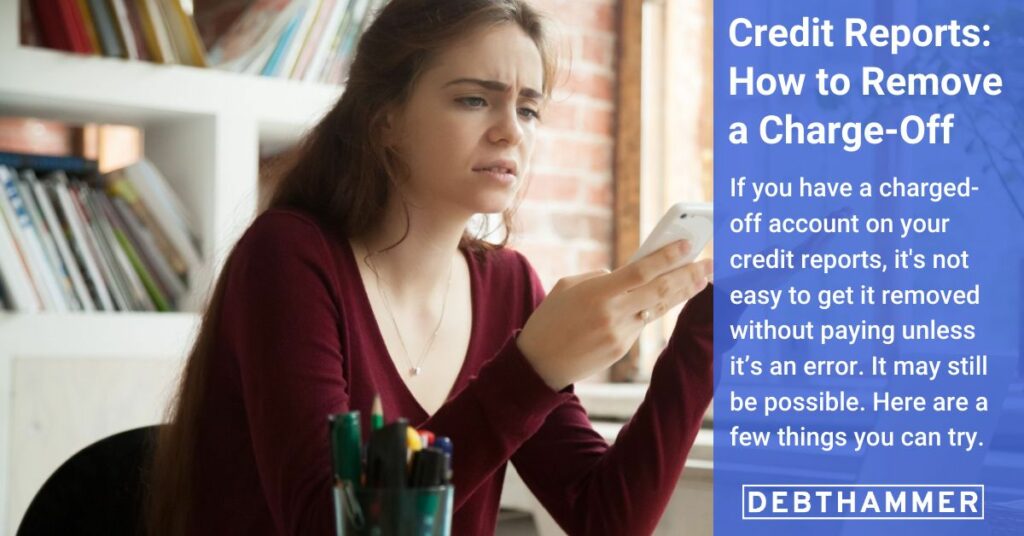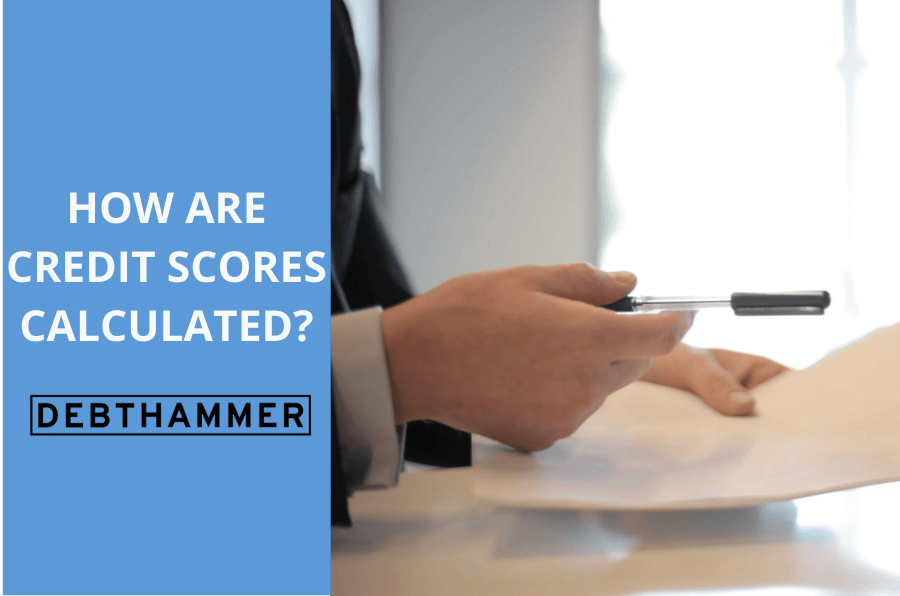A charge-off is poison for your credit score. It’s a serious negative item on your credit report and will harm your chances of getting competitive rates on loans or being approved for a credit card.
It’s not easy to remove a charge-off from your credit report unless it’s a mistake. However, it isn’t impossible. Here’s what you need to know.
Our take
- A charge-off means that you’ve stopped making payments and your creditor has decided that you will never repay your debt
- It’s very difficult to get a legitimate charge-off removed, but there are a few steps you can try on your own
- A debt relief company our credit counseling agency may be able to help you
- Your FICO score will take a nosedive: A single charge-off can knock 50 to 200 points off your score and you won’t be able to qualify for new credit
Too much debt in collections?
We may be able to help. It’s easy and free to find out.
How to remove charge-offs without paying
There’s no surefire way to remove a charge-off from your credit report unless it’s an error. It’s still worth trying. Here are some methods that may work.
1. Hire a debt relief company
A third-party debt relief or debt settlement company will negotiate with your creditors on your behalf to settle the debt for an amount that’s less than the full amount you owe. There are no upfront fees, so you don’t pay for the service until a settlement agreement has been reached and you accept it. During the settlement process, you will make monthly payments to the debt settlement company, who will hold your money in a dedicated savings account until settlements are ready to be paid.
READ MORE: How debt settlement works
2. Consult a credit counseling agency
If you have a credit card account that’s been charged off, a credit counseling agency may be able to help by setting up a Debt Management Plan. In exchange, the creditor may agree to remove the charge-off notation. However, you’ll pay a monthly fee and end up repaying the full amount you owe on the account.
READ MORE: Debt management vs. debt settlement
3. Negotiate on your own
If the creditor has not yet sold your debt, try to negotiate a payment arrangement. This could be a payment plan or a settlement that allows you to pay less than the total amount you owe.
Contact your credit card company or lender directly. If you’ve missed several payments due to a one-time major event like a medical crisis, explain why. If you have a positive payment history up until trouble hits, mention that. The creditor might be willing to set up a payment plan that keeps the debt off your credit report.
Pro tip: If the creditor has sold the debt to a debt collector, negotiation becomes more difficult. The original creditor has no incentive to work with you because it’s no longer their debt. In this case, you’ll probably have to accept the charge-off and focus on resolving the collection account.
If you negotiate a payment plan or a settlement, get a commitment from your creditor in writing. Only offer what you can afford to pay.
Your creditor may refuse to negotiate
You cannot force a creditor to remove a legitimate charge-off from your credit record. It will stay on your credit report for seven years, even if you pay it.
A creditor that charges off a debt will usually sell the account to a third-party debt collector. If this happens, a new entry will appear on your credit report in a section headed “collections.” The collections entry is also a derogatory item that will further reduce your credit score.
If you can pay the debt or negotiate a settlement before the collection agency reports to the credit bureaus, you may be able to avoid having the collection entry placed on your report.
Pro tip: Even if the statute of limitations on debt in your state expires, you still legally owe the debt. The statute of limitations is simply the amount of time a creditor can sue you in an effort to collect your debt.
4. Dispute the charge-off
Disputing an accurately reported, legitimate charge-off is generally a waste of time. There are, however, some situations where disputing a debt’s charged-off status is the right move.
- The debt is not yours.
- The debt was paid.
- More than seven years have passed since the debt first became delinquent.
If a charge-off on your credit report fits any of these descriptions, you can and should dispute it using the credit report dispute process.
Pro tip: It’s essential to routinely monitor your credit reports for any negative information that might be inaccurate. If you find errors, start the dispute process immediately. Pull free credit reports once a year to look for charged-off acounts and other black marks that might be incorrect.
You can dispute with any of the three major credit reporting agencies: Experian, Equifax, and TransUnion. You will send a simple dispute letter identifying yourself and the account number for the item you’re disputing and explaining the nature of your dispute.
You should be prepared to document your claims.
If one credit bureau determines your dispute is legitimate, they will forward the information to the others. You don’t need to file disputes with all three.
5. Send a pay-for-delete letter
Creditors don’t like to charge off debts. For them, that makes the debt almost a total loss: if they sell the debt to a collection agency, they will get only pennies for every dollar of debt.
A pay-for-delete letter offers a deal: you’ll pay all or part of your debt if the creditor agrees to delete the record of your charge-off. There’s no guarantee that the creditor will accept and they aren’t obligated to delete the record, but it’s worth a try.
Pro tip: Keep your letter brief, and make sure the offer is clear. (You can find a suitable template here). Only offer what you can afford to pay. If the creditor agrees to the arrangement, get a written commitment before you make the payment.
A charge-off will damage your credit score
A charge-off is not a collection account. It’s much worse. A charge-off on your credit report means your creditor has decided your debt is uncollectible. It won’t happen because of one or two missed payments. The credit card issuer or other creditor had given up on debt collection efforts, closed your account, and written your debt off as a loss.
Most creditors will charge off accounts when a borrower’s account is about six months past due, but the time frame may vary.
READ MORE: What does “charged off as bad debt” mean?
Charge-offs don’t mean your debt is forgiven
Charge-offs do not make an old debt go away. You’re still legally obligated to pay all delinquent accounts. As long as the debt appears on your credit report, you can contact the creditor to make payment, which will change the status to “paid charge-off”
Pro tip: The listing will remain in your credit history, but most lenders view a paid charge-off as a less damaging record than an unpaid charge-off.
Don’t fall for credit repair scams
Some credit repair companies — not reputable ones — claim that they can improve bad credit scores by getting egitimate negative accounts removed from credit reports. They may advise you to dispute every late payment or negative record a creditor reports to the three major credit bureaus, or they or offer to do it for you (for a fee, of course).
The Fair Credit Reporting Act (FCRA) requires credit bureaus to verify your account within 30 days. Sometimes, even a legitimate creditor will fail to verify, and the account will be removed.
That’s especially true of older collection accounts passed from one collector to another. That is one case where it could be worth disputing an account you know is yours. Information may have been lost as the account was passed on.
However, the credit bureaus are familiar with this strategy, and it’s unlikely to work.
Pro tip: If a credit repair company makes promises that sound realistic, contact the Consumer Financial Protection Bureau to ensure you aren’t being scammed.
The bottom line
If you’ve got a charge-off on your credit report and you think it’s a mistake, it’s important that you take action right away. If it’s legitimate, remember that the debt does not disappear. You’re still obligated to pay it. It’s in your best interest to try to negotiate a lower payment or contact a credit counselor for advice on your next steps. Best of all, do whatever you need to do to keep your accounts in good standing.




